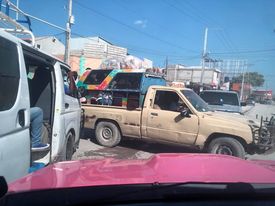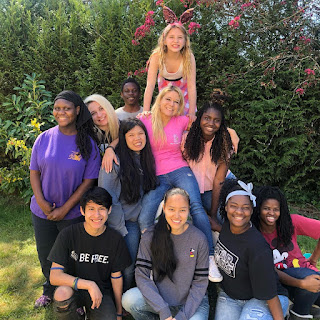I just thought I would share a few observations about "normal" life in Haiti. This is by no means comprehensive, just a few thoughts.
Driving In Haiti: As more of our kids reach driving age, we face the dilemma of deciding whether or not to teach them to drive in Haiti. In addition to the normal driving lessons to consider (which is already enough for any parent), we also have Haiti to consider. Traffic laws are mostly the same as the US, however adherence is nothing like it. Intersections are "every man for himself" so to speak. If you see a chance to block the intersection, you better take it. If you don't, you will never get through. Signs are ignored--if they exist at all. Lights and stop signs are simply suggestions. A couple of years ago, I almost got a ticket for stopping at a red light! I stopped looked both ways, and by that time I had a policeman standing at my window yelling at me to get going or get my license taken. Police will randomly stop you to try to find a problem, so that they can demand money.
Pedestrians are everywhere, as are motorcycles. Motorcycles don't follow the same rules, they somehow even ignore police directing traffic. They weave through traffic like it is an obstacle course challenge. To add to the confusion, they are either covered with lights, or have no lights at all. This is quite dangerous in the dark. When curb parking, you are required to have both right side tires on the sidewalk. Our car was impounded by the police 5 years ago, for not being far enough on the sidewalk.
Haiti is a very mountainous country, and all of our vehicles are manual transmission. This is good for the kids to learn, but difficult since the hills here are very steep. And to top it off, if there is an accident, the courts are likely to say, "It was their fault, but you have access to money. Therefore, you need to repair their car as well". So, do we teach them to drive here? This has been a struggle for us every time someone turns 16.
Banking in Haiti: Most Americans in Haiti will tell you it is not safe to go to the bank here. If you withdraw what is considered a lot of money here($50 US), you can be at risk of being robbed or killed. Many people are robbed and some killed after leaving a bank. The teller is often in on the robbery and will get a small cut from the robbers for the notifying them who has withdrawn money and how much they withdrew. Despite this risk, banks here are very busy. I went to the bank last week and from the time I arrived until I left was 1 hour 55 minutes. This is in line with a normal trip to the bank here.
Just going into a bank here you will see a lot of differences from the US. First, the line is likely to go all the way outside. I have gone to the bank where I stood in line for 45 minutes before even getting inside the building. The security guards regulate the entry of people. There are always at least 2 guards with 12 gauge shotguns and pistols. As the security in Haiti gets worse you can see this in the guards. My last trip to the bank, one guard unlocked the door and let me in while the other stood watching with his shotgun raised and finger on the trigger. Once the first guard determined I didn't have a weapon, the second lowered his gun. They did this for every person that entered while I was there. They are also responsible to tell you where to stand in line. This works well, since no one wants to argue with the guy holding the gun. Once you are inside the building, everything changes from Haitian Creole into French (which I don't speak). Also, you cannot use your cell phone in the bank. Not even to check the time; it stays in your pocket. Some banks don't even allow the phone inside. Since everything inside is in French, I need help filling out the forms. This is different depending on the bank, branch, or employees mood. Sometimes, I have to go through a different line, just to get the form, and return to the first line to get back to the teller. All of this while watching the wealthy regulars walk in and go straight to the front of the line, sometimes actually moving someone away from a teller window. All with no complaints from the other customers.
Shopping in Haiti: This experience can vary greatly depending on what you are trying to buy and where you are. There are a few upscale shops, but not many or at least not widely known. There are a handful of "American" style stores (where you would push a cart through the isles). Then there are the smaller stores that you can select things from the shelves. All of these stores have a few things in common. They will all have security guards with shotguns, cashiers at registers, and almost always a boss sitting in an elevated platform to watch everything. They will also have a lot of employees milling about. Their job, however, is to watch you and not to help you.
Hardware stores, as well as a few others add another level of protection from theft by checking everything you are carrying to the receipt. This is nothing like Costco or Walmart. I once purchased a box of 1000 screws, and they dumped out the box to count every screw three times over! There were only 992 screws. They were confused and didn't know what to do. I told them it was not a problem. They still would not let me go. They called a supervisor over and he gave me a small measuring tape and let me go.
Most of the population does their shopping at what are called "boutiks" (boutiques). These are not generally specialty stores like a boutique would be in the US, but they do have a theme (food, hardware, auto parts, some others). These stores vary in size from that of a convenience store down to barely large enough for the seller to stand inside. The standout characteristic of these shops is that you need to know what you want (and for me, I need to be able to say it so that they can understand). All of the merchandise is inside behind bars with the person selling. You tell them what you want, they either write it down or tell someone else. Then you go to the cashier, who is in a different room behind bars and plywood with a slot to slide money and a tiny hole to speak through. You give them money, hoping that you are paying for your stuff since there are customers all pushing money through the slot. They give you a receipt and you either return to the first person, or find a worker to take your receipt and bring you items.
Most fruits and vegetables are sold on the street...everywhere. Although there are dedicated markets and market days for this, Haiti law allows anyone to sell anyplace (mostly) on the street. Many items can also be purchased from people walking the streets carrying their inventory. These vendors could be selling food, water, juice, coffee, alcohol, windshield wipers, phone chargers, shoes, bowls, bread, fans, lights, gasoline, puppies, or anything that they can carry or push in a cart. They will come right up to your window with their stuff (even if you tell them no). Linda likes to buy papitas--plantains sliced full length and fried like a potato chip. We have really only ever bought papitas and the occasional phone charger from these vendors.








